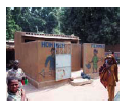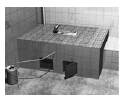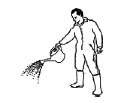Ecological Sanitation
Promoting health and preventing disease 1, 2, 3, 4
The majority of excreted pathogens are found in faeces. Urine is usually sterile (free of disease-causing organisms) and poses a risk only in special cases.
After they are excreted into the environment all pathogens eventually die or become incapable of causing disease. A number of environmental conditions will speed up the time it takes a pathogen to die, depending on the characteristic or level of the condition: increase in temperature, decrease in water content, decrease in nutrient and organic matter content, increase in sunlight and pH. Each of the conditions can vary naturally (e.g. wet and dry seasons) or artificially (e.g. addition of lime).
To avoid disease transmission, ecological sanitation therefore recommends (i) not mixing urine and faeces and (ii) destroying pathogens in faeces by dehydration, decomposition or the addition of lime. See ecosan systems...








